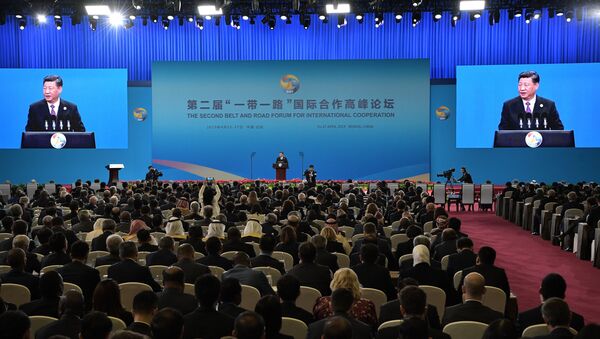China has begun its state tour of countries in the European Union (EU) and Central and Eastern European Countries (CEEC), with Chinese state councillor and foreign minister Wang Yi meeting his counterpart, Polish foreign minister Jacek Czaputowicz in Warsaw on Sunday, to discuss deepening cooperation on the Chinese Belt and Road Initiative (BRI), CGTN reported.
Mr Czaputowicz said that Poland was willing to actively take part in building the Belt and Road Initiative, as well as strengthening bilateral exchanges and forging China-CEEC and EU-China ties via the EU-China 2020 Strategic Agenda for Cooperation.
— People's Daily, China (@PDChina) July 7, 2019
During Monday’s opening ceremony of the China-Poland Intergovernmental Cooperation Committee’s second plenary session, the Polish FM said he was “happy that after four years’ break”, the [Committee] was meeting “for the second time”.
FM Wang Yi welcomed the Polish FM’s remarks and called for Poland to exploit the BRI's transport system, adding that ease of trade between Asia and Europe has grown by rail but maritime trade had become congested due to increasing cargo ship traffic.
Mr Czaputowicz also requested “more fruitful” talks in the 17+1 format, which facilitates Chinese investment in CEEC and Western Balkan countries, in addition to closing trade “asymmetry” between China and EU trade partners.
“China is willing to share its #5G development opportunities with the world to benefit people in more countries, Chinese State Councilor and Foreign Minister Wang Yi said when meeting the press with Polish Foreign Minister Jacek Czaputowicz”.
— Alam Chaudry (@Alam_Chaudry) July 9, 2019
Outside of the BRI's major partners such as Russia and Pakistan, multiple countries in the EU are leading in the race to work with Beijing, with several economic powerhouses pledging further support to the landmark project and signing agreements, leading to further economic growth and interconnectivity between East and West.
Italy
The Mediterranean country was the first G7 country to join the Silk Road after launching its China Task Force programme via the Ministry of Economic Development (MISE) in August last year.
Italian prime minister Giuseppe Conte and Chinese president Xi Jinping later signed a memorandum of understanding (MoU) in late March and officially joined China’s BRI project, with the Italian PM stating that it was “time for a more effective relationship between Italy and China”, in addition to pledging £760bn to the initiative.
Hungary
Talks between Beijing and Budapest took place in November last year, with Hungarian prime minister Viktor Orban reaffirming his pledge to the BIR at the China International Import Expo (CIIE) in Shanghai.
Mr Orban said that Hungary had become “the growth engine of Europe” and that rational socioeconomic policies in CEEC countries had helped the region to become “the source of future development”.
— TRANSLOG Connect Congress (@TRANSLOGConnect) July 9, 2019
Hungary also became the first European country to sign a bilateral agreement on the Silk Road, Orban stated, adding that his country was host to Chinese companies such as Huawei, Bank of China, Wanhua and BYD, who helped raise the country’s GDP growth rate by 4 percent, as well as launching Huawei’s largest productions and logistics site outside of China.
UK
Despite strained ties between the UK and China over security and Huawei, UK chancellor of the Exchequers Philip Hammond reaffirmed its commitment to China’s BRI in April, calling it a “vision” and stating that the UK would contribute British expertise in project financing, Reuters reported.
Mr Hammond said that the BRI had “tremendous potential to spread prosperity and sustainable development” to 70 percent of the global population, adding it was a “project of truly epic ambition”.
— RT UK (@RTUKnews) June 18, 2019
“The BRI is an extraordinarily ambitious vision,” Hammond said. “To turn that vision into a sustainable reality, it must work for everyone involved.”
UK telecoms giant Vodafone also launched its 5G services across the UK using Huawei equipment, breaking away from warnings in Washington not to use the Chinese tech giant’s IT technologies.
Germany
Whilst Berlin has criticised Rome and others for partnering with Beijing, Germany itself has launched several initiatives, mainly in Duisberg, a city with deep ties to China, Deutsche Welle reported. Ties with the German city began in 1982 after being twinned with Wuhan.
— Lijian Zhao 赵立坚 (@zlj517) July 7, 2019
But Duisburg, which has been hit by 11 percent unemployment and is referred to as Germany’s “Rust Belt”, following a lull in steel and coal production, the city has seen unprecedented growth over 20 years due to the BRI, which has brought 7,000 jobs.
Plans are also underway to link Europe with Asia via Duisburg’s inland port – the world’s largest – with the Maritime Silk Road and the massive Diamond Silk railway, which connects 48 Chinese cities with 42 European ones, with the German city as a key hub.
German IT conglomerate Deutsche Telekom’s also launched its joint venture with Huawei via Europe’s first 5G broadcast in Berlin-Schoenberg in 2017, paving the way for future cooperation on 5G telecoms development.
France
French president Emmanuel Macron met with President Xi Jinping for a three-day state visit at the Elysée Palace in April, where he called for a “strong Europe-China partnership” based on “strong multilateralism” that was “fair and balanced” for trade.
The two countries signed multiple deals on cultural exchange, green energy, and others, in addition to Beijing buying 290 Airbus A320s and 10 A350 airliners, worth £32bn ($40bn).
Dunkirk Port views BRI as springboard to boost trade between France and China https://t.co/Ix7AjsZSSd pic.twitter.com/iD4VorTY60
— Sea News (@SeaNews11) May 21, 2019
Although President Macron has taken a tougher approach to the BRI, Paris and Beijing are approaching the initiative on a project-by-project basis and talks have been positive, according to the French Institute for International Relations (IFRI).



